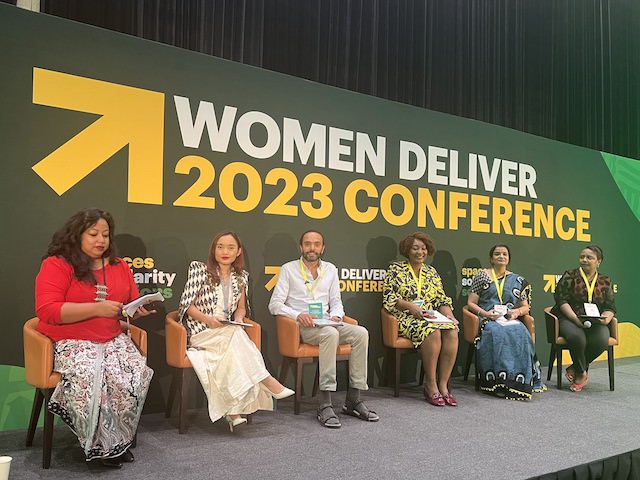
“I’m all of it at the same time. If I’m a believer, I’m secular enough. If I’m a Muslim, I’m Indian enough. I don’t have to prove my Indianness or my Muslimness to anybody. There is no contradiction in me being a Muslim and me being an Indian, and me believing in the Quran and believing in the Constitution. We’re not bothered about fitting into categories people have made for us.” – Dr. Noor Jehan Safia Niaz, Founder of the Indian Muslim Women’s Movement.
In the heart of Women Deliver’s vibrant atmosphere, these powerful words resounded in a dialogue held in a packed hall at Kigali Convention Center, drawing a crowd of around 150 attendees. At the center of this discussion was the realization that family law isn’t just a legal matter—it’s a vital feminist issue with far-reaching consequences for women’s freedom and agency.
This year marked Musawah’s first-ever participation in the Women Deliver Conference. The conference was held in Kigali, Rwanda in July 2023, as one of the largest multi-sectoral convenings to advance gender equality with more than 6000 in-person attendees. The Global Campaign for Equality in Family Law, a coalition led by 8 organizations including Musawah, conducted a concurrent session at the conference titled “Family Law: A Crucial Feminist Issue for Achieving Gender Equality”.
Beyond Legislation: The Ripple Effects of Family Law
The session was led by a diverse panel, each with unique perspectives and rich experiences Noorjehan Safia Niaz, Founder of the Indian Muslim Women’s Movement (BMMA), Memory Kachambwa, the Executive Director of FEMNET in Kenya, Bassem Maher, a Peacebuilding Consultant for Act Church of Sweden from Egypt, Dea Safira, a Youth Activist and Founder of Indonesia Feminis, and Meskerem Geset Techane, a member of the UN Working Group on discrimination against women and girls. . Hyshyama Hamin, the Campaign Manager of the Global Campaign for Equality in Family Law, moderated the session.
Collectively, the panelists brought to light a distressing reality: women worldwide are disproportionately impacted by discriminatory family laws and practices. These inequities span from the inability to consent to marriage without the guardian’s permission, to limited options for divorce, the absence of matrimonial property distribution regimes, uneven inheritance rights, and inequality of child custody, guardianship, and nationality rights. These injustices perpetuate a cycle of gender inequality, often justified by religious, cultural, and traditional norms.
The conversation went beyond legal terminology and discussed the real-world consequences of inequality in family law. Research was mentioned supporting the correlation between gender inequality and discriminatory family laws. The panelists highlighted their observations on a troubling trend—nations with deeply entrenched gender disparities are often those where family laws perpetuate inequalities. These disparities manifest in areas like education, economic participation, health, political empowerment, and overall societal contribution.
From Dialogue to Action: Challenging the Patriarchal Hold over Families
The discussion then shifted to actions taken for family law reform on a global scale. This resonated deeply with the attendees who shared their own experiences and stories, demonstrating. the need for a drastic shift in the entrenched traditions in families towards equality. The panelists responded by sharing some of the positive impact they have witnessed, and strategies they have employed in their regions, igniting hope for change among the audience.
Dr. Noorjehan Safia Niaz spoke of BMMA’s remarkable journey in mobilizing a grassroots movement of Indian Muslim women. Through relentless efforts, BMMA leveraged the Indian Constitution to advocate for the ban on triple talaq—a practice allowing men to divorce their wives with a mere declaration. This achievement is a testament to the power of collective action and legal advocacy. Dea Safira shed light on the active engagement of youth and women in Indonesia concerning gender equality and family law. Her platform, Indonesia Feminis, has harnessed the potency of social media to spark dialogue, awareness, and action. Dea’s optimism lies in the potential of young generations to challenge norms, demand equality, and inspire transformation in Indonesia and beyond.
Meskerem Geset Techane encouraged advocates to engage with the UN human rights system, including the UN Working Group on discrimination against women. She emphasized that these mechanisms hold states accountable for ensuring equality, even in the face of political resistance. Bassem Maher shared the transformative impact of the Evangelical Lutheran Church of Jordan and the Holy Lands, which instituted gender equality through the Lutheran Family Law. The change was brought about by faith-based leadership that recognized the importance of equitable family laws, thereby challenging traditional narratives. Memory Kachambwa emphasized the significance of regional instruments like the Maputo Protocol. Marking its 20th anniversary, the Protocol has played a pivotal role in advancing gender equality in Africa. Each story spoke of the power of collective action and the determination to challenge inequality and highlighted women’s rights groups’ resilience and the potential of collective organizing and regional collaboration to bring about this urgent change.
Our Unified Call: Global Family Law Reform
From diverse voices emerged a unified call—to dismantle discriminatory family laws, defy categorizations, and demand justice. Our mission is clear: to drive progressive family law reform that dismantles these inequalities, without letting States misuse religion and culture to uphold discriminatory laws. Stepping out of the session, I felt invigorated by the prevailing sense of purpose in the air. Family law reform isn’t an isolated cause; it’s the cornerstone for women’s empowerment. We have a shared responsibility to ensure that family laws do not constrain women’s rights, but rather elevate them to full agency and potential.
As Noor Jehan Safia Niaz’s words reverberated, the session exemplified that women need not fit into predefined categories; their stories, experiences, and insights shatter those confines.
Fer Ghanaa Ansari is Musawah’s International Advocacy Programme Officer.
Reach out to her at [email protected]
